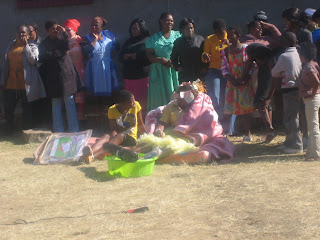I have attended several weddings here – both “white” (as in a white dress) and traditional, but I had not yet attended a Labolla ceremony. That is until this past week. I went with some of my co-workers to the Labolla ceremony of Mlekeleli’s sister. This part of the marriage process here is very similar to the bridal showers we have in the states. Well, similar in that the bride is the main attraction and people give her domestic gifts and money and there is a lunch served. That is really where the similarities stop because in the states a cow is not usually slaughtered as part of the process nor is the groom kept hidden on the property. I have also never been to a bridal shower that involved costume changes unless one considers the toilet-paper wedding dress game a costume change! This party is actually the second step in the Labolla process. The first step being the actual paying of Labolla, which is attended by men only.
As I have gotten to know some of the women in my life better we have had some good conversations about the Labolla process. Once Labolla is paid, the man and woman are considered married, but the paying of Labolla is not a simple process. For a young, healthy women with no kids it is around 13 cows or the equivalent in Rand. Someone recently offered to pay Derek 18 cows for me and Sanele (our isiZulu teacher) told me that since I have an education and no children and am very healthy I would be very expensive. Well. Well. Anyways, what often ends up happening is that the process takes so long that either the woman gets pregnant (either because her clock is ticking or in an effort to lower her price), but then often the Labolla is still never paid. Marriage rates are very low although birth rates are very high. I also am not really a fan of Labolla, because, come on – you cannot put a price on a person. Way too old school for me. This practice, to me, seems to be perpetuating the belief that women are not equal with men and so therefore can be priced and paid for.
I was not in a picture taking mood so I missed many of the best photo opts. There was of course traditional Zulu dancing, but at lunch time a DJ busted out some dance music and we shook our booties. At first I thought they were laughing at my inability to dance, but I was told that the people were laughing because they didn’t know white people could dance! Lucky for them this white person spent much of her formative years under the guidance of the lovely women from Karline’s and was taught how to correctly get down! This is a photo of the bride with money stuck to her head and some of my lovely co-workers and me on our way home.

